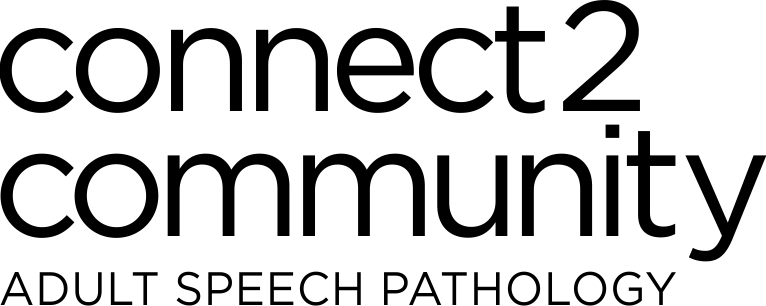

Acquired NEUROLOGICAL Communication DisorderS
cognitive Communication disorderS
RIGHT HEMISPHERE DISORDER
TRAUMATIC BRAIN INJURY
What is a Cognitive-Communication Disorder?
A cognitive-communication disorder can result in a person having difficulty with any aspect of communication (listening, speaking, reading, writing, conversation, and social communication) affected by disruption of cognition (how the person thinks, learns and remembers). Cognition includes being able to pay attention, remember and think, plan and organise, solve problems and reason.
Communication is a complex process which involves thinking (cognition), social and conversation skills – these skills work together to help us communicate effectively with the world around us. Problems in these areas can affect verbal and nonverbal communication (e.g., facial expression, tone of voice). Problems with cognitive-communication can affect activities of daily living, academic and work performance, and social connections.
What causes a cognitive-communication disorder?
Cognitive-communication disorders may occur after a stroke (right hemisphere lesion), traumatic brain injury, neurosurgery, tumour, progressive neurological disorder (e.g., dementia) or other neurological damage.
Communication and Attention
The ability to pay attention is important for successful communication. Difficulty sustaining attention, high levels of distractibility, and the inability to divide attention between more than one task (e.g., talking on the phone whilst making a cup of tea) can have a significant impact on communication. Attentional skills are an essential foundation to support other cognitive abilities. The ability to pay attention is necessary for memory and learning, information processing, executive functioning and communication.
A person with attention difficulties may experience the following impact on their communication:
- Sustained attention: e.g., difficulty reading a book chapter, following a conversation, following verbal or written instructions
- Selective attention: e.g., being distracted during conversations
- Alternating attention: e.g., difficulty typing an email and stopping to answer the phone, then being able to accurately and efficiently return to the original task
- Divided attention: e.g., difficulty following written instructions in a recipe book and carrying out the cooking task at the same time.
Communication and Memory
Memory refers to the mental processes which help us learn, retain and recall information, interpret information, and organise and store into memories. Memory also includes being able to access this stored information when required. Memory impairment will have an impact on the person’s communication.
A person with memory difficulties may experience the following impact on their communication:
- Difficulty remembering experiences or information (all or parts of information communicated)
- Lose train of thought mid-sentence or mid-conversation (often if interrupted or distracted)
Communication and Information Processing
Information processing is a part of our cognitive (thinking) functioning that has an impact on most things we do, including communication. It refers to our ability to efficiently manage and absorb information we are presented with. Information processing is linked with attention, memory, executive functioning, language processing and perception. Information processing consists of three main components: (1) Capacity i.e., how much information a person can process, (2) Speed of processing ie., the speed at which information can be processed, (3) the ability to plan, organise and prioritise thinking processes.
A person with information processing difficulties may experience the following impact on their communication:
- Long pauses in a conversation
- Requiring additional time to think and respond to questions
- Difficulty following group conversation
- Difficulty managing busy, noisy environments which add to the processing ‘load’ and can make it more difficult to understand and follow conversation.
- Difficulty understanding when a lot of information is given at once, or too quickly.
Social Communication
Social communication refers to the how and why we use language to interact with other people. Social communication ability enables individuals to make decisions about communication based on who we are communicating with and why we are communicating. Social communication difficulties can impact on interpersonal relationships and the monitoring of our social awareness and judgement.
A person with social communication difficulties may experience the following impact on their communication and this can impact on a person’s ability to build and maintain social relationships.
- Difficulty reading nonverbal communication (facial expression, body language, tone of voice)
- Talking too much or too little
- Impaired ability to make judgements about the appropriateness of the content of communication and about the manner of communication (calm versus loud and aggressive)
- Difficulty initiating communication
Behaviour and communication
Challenging behaviour can be used as a term to describe behaviour which is perceived as inappropriate to the social situation. Following a cognitive-communication disorder diagnosis, a person may demonstrate challenging behaviour, which may be triggered by confusion, disorientation, misunderstanding, fear, anxiety, fatigue, and is subsequent to an impairment of cognition and communication (including language processing). Challenging behaviour, whatever its nature, can be viewed as having a communicative purpose: i.e., the behaviour communicates that there is something the person needs or wants or that there is a problem which requires attention. Due to the effects of brain injury ( or secondary mental health issues) the person is unable to express their wants/needs in a more appropriate and effective manner.
It’s important to be aware of the following:
- Cognitive-communication disorders are problems with communication that have an underlying cause in a cognitive deficit rather than a primary language (aphasia) or speech deficit (dysarthria or apraxia of speech)
- Cognitive-communication difficulties can be quite subtle in a structured hospital setting and can be more significant and noticeable once the person has transitioned back to home and their community.
PHONE 0411 864 386
EMAIL info@connect2community.au
